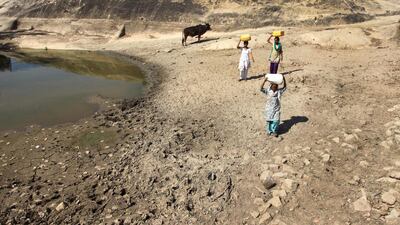National Editorial
Water is crucial to humanity and our future. From the availability of drinking water to the devastating effects of flood and drought, our lives literally depend on it. India is no exception to this global reality – but its situation is worse than many other nations, thanks to poor policies and practices, and the sheer demand on resources of the world’s second largest population.
Two weak monsoons have resulted in severe water shortages and crop losses in as many as 10 Indian states. The current drought that has claimed hundreds of lives has provoked haphazard responses from the authorities, such as a ban on cooking between 9am and 6pm in some states to prevent accidental fires, imposition of curfews near water sources and deployment of water trains to the worst-affected regions. As The National reports, in Madhya Pradesh, where four reservoirs have dried up, the authorities have no option but to truck in supplies.
The water situation is not much better even when there is no drought. About half of Indian villages have no access to safe drinking water, while no city in the country enjoys water supply 24 hours a day, seven days a week, that can be consumed without health concerns. The future looks even worse. According to estimates, demand for water in India will outstrip supply by as much as 50 per cent by 2030.
The situation should not be so dire, because unlike oil and gas, water is a renewable resource. With existing technology, better management practices, and efficient use, the country should have more water to meet potential needs for many decades to come.
The recent launch of the e-mandi scheme by prime minister Narendra Modi signals the government’s commitment to modernising the agriculture sector, which is necessary to feed the growing population. And the only way this can be done is by improving water management. Failing to address the challenges will most certainly mean an unprecedented water crisis. It’s a tough task, but there is simply no other option.

